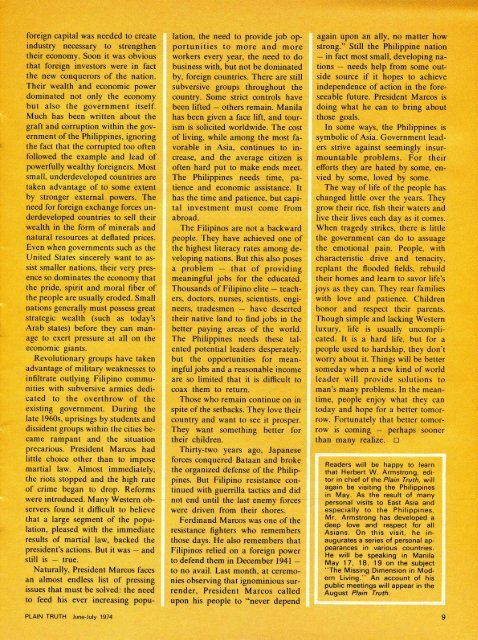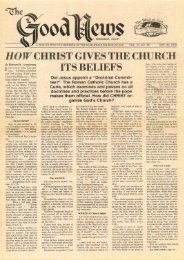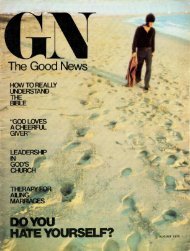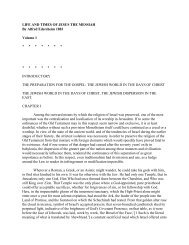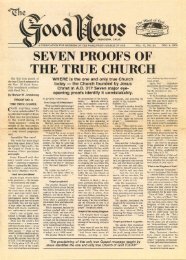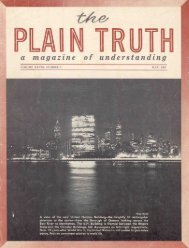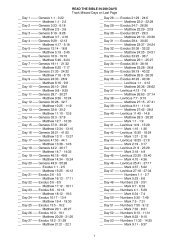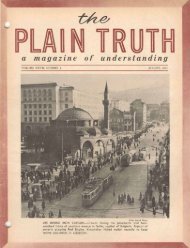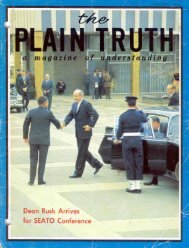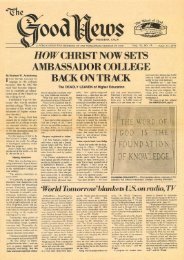You also want an ePaper? Increase the reach of your titles
YUMPU automatically turns print PDFs into web optimized ePapers that Google loves.
foreign capital was needed to create<br />
industry necessary to strengthen '<br />
their economy. Soon it was obvious<br />
that foreign investors were in fact<br />
the new conquerors of the nation.<br />
Their wealth and economic power<br />
dominated not only the economy<br />
but also the government itself.<br />
Much has been written about the<br />
graft and corruption within the government<br />
of the Philippines, ignoring<br />
the fact that the corrupted too often<br />
followed the example and lead of<br />
powerfully wealthy foreigners. Most<br />
small, underdeveloped countries are<br />
taken advantage of to some extent<br />
by stronger external powers. The<br />
need for foreign exchange forces underdeveloped<br />
countries to sell their<br />
wealth in the form of minerals and<br />
natural resources at deflated prices.<br />
Even when governments such as the<br />
United States sincerely want to assist<br />
smaller nations, their very presence<br />
so dominates the economy that<br />
the pride, spirit and moral fiber of<br />
the people are usually eroded. Small<br />
nations generally must possess great<br />
strategic wealth (such as today's<br />
Arab states) before they can manage<br />
to exert pressure at all on the<br />
economic giants.<br />
Revolutionary groups have taken<br />
advantage of military weaknesses to<br />
infiltrate outlying Filipino <strong>com</strong>munities<br />
with subversive armies dedicated<br />
to the overthrow of the<br />
existing government. During the<br />
late 1960s, uprisings by students and<br />
dissident groups within the cities became<br />
rampant and the situation<br />
precarious. President Marcos had<br />
little choice other than to impose<br />
martial law. Almost immediately,<br />
the riots stopped and the high rate<br />
of crime began to drop. Reforms<br />
were introduced. Many Western observers<br />
found it difficult to believe<br />
that a large segment of the population,<br />
pleased with the immediate<br />
results of martial law, backed the<br />
president's actions. But it was - and<br />
still is - true.<br />
Naturally, President Marcos faces<br />
an almost endless list of pressing<br />
issues that must be solved: the need<br />
to feed his ever increasing popu-<br />
PLAIN TRUTH June-JUly 1974<br />
lation, the need to provide job opportunities<br />
to more and more<br />
workers every year, the need to do<br />
business with, but not be dominated<br />
by, foreign countries. There are still<br />
subversive groups throughout the<br />
country. Some strict controls have<br />
been lifted - others remain. Manila<br />
has been given a face lift, and tourism<br />
is solicited worldwide. The cost<br />
of living, while among the most favorable<br />
in Asia, continues to increase,<br />
and the average citizen is<br />
. often hard put to make ends meet.<br />
The Philippines needs time, patience<br />
and economic assistance. It<br />
has the time and patience, but capital<br />
investment must <strong>com</strong>e from<br />
abroad.<br />
The Filipinos are not a backward<br />
people. They have achieved one of<br />
the highest literacy rates among developing<br />
nations. But this also poses<br />
a problem - that of providing<br />
meaningful jobs for the educated.<br />
Thousands of Filipino elite - teachers,<br />
doctors, nurses, scientists, engineers,<br />
tradesmen - have deserted<br />
their native land to find jobs in the<br />
better paying areas of the world.<br />
The Philippines needs these talented<br />
potential leaders desperately,<br />
but the opportunities for meaningful<br />
jobs and a reasonable in<strong>com</strong>e<br />
are so limited that it is difficult to<br />
coax them to return.<br />
Those who remain continue on in<br />
. spite of the setbacks. They love their<br />
country and want to see it prosper.<br />
They want something better for<br />
their children.<br />
Thirty-two years ago, Japanese<br />
forces conquered Bataan and broke<br />
the organized defense of the Philippines.<br />
But Filipino resistance continued<br />
with guerrilla tactics and did<br />
not end until the last enemy forces ' .<br />
were driven from their shores.<br />
Ferdinand Marcos was one of the<br />
resistance fighters who remembers<br />
those days. He also remembers that<br />
Filipinos relied on a foreign power<br />
to defend them in December 1941-<br />
to no avail. Last month, at ceremonies<br />
observing that ignominious surrender,<br />
President Marcos called<br />
upon his people to "never depend<br />
again upon an ally, no matter how<br />
strong." Still the Philippine nation<br />
- in fact most small, developing nations<br />
- needs help from some outside<br />
source if it hopes to achieve<br />
independence of action in the foreseeable<br />
future. President Marcos is<br />
doing what he can to bring about<br />
those goals.<br />
In some ways, the Philippines is<br />
symbolic of Asia. Government leaders<br />
strive against seemingly insurmountable<br />
problems. For their<br />
efforts they are hated by some, envied<br />
by some, loved by some.<br />
The way of life of the people has<br />
changed little over the years. They<br />
grow their rice, fish their waters and<br />
live their lives each day as it <strong>com</strong>es.<br />
When tragedy strikes, there is little<br />
the government can do to assuage<br />
the emotional pain. People, with<br />
characteristic drive and tenacity,<br />
replant the flooded fields, rebuild<br />
their homes and learn to savor life's<br />
joys as they can. They rear families<br />
with love and patience. Children<br />
honor and respect their parents.<br />
Though simple and lacking Western<br />
luxury, life is usually un<strong>com</strong>plicated.<br />
It is a hard life, but for a<br />
people used to hardship, they don't<br />
worry about it. Things will be better<br />
someday when a new kind of world<br />
leader will provide solutions to<br />
man's many problems. In the meantime,<br />
people enjoy what they can<br />
today and hope for a better tomorrow.<br />
Fortunately that better tomorrow<br />
is <strong>com</strong>ing - perhaps sooner<br />
than many realize. 0<br />
Readers will be happy to learn<br />
that Herbert W . Armstrong, editor<br />
in chief of the Plain Truth, will<br />
again be visiting the Philippines<br />
in May. As the result of many<br />
personal visits to East Asia and<br />
especially to the Philippines,<br />
Mr. Armstrong has developed a<br />
deep love and respect for all<br />
Asians. On this visit, he inaugurates<br />
a series of personal appearances<br />
in various countries.<br />
He will be speaking in Manila<br />
May 17, 18, 19 on the subject<br />
"The Missing Dimension in Modern<br />
Living." An account of his<br />
public meetings will appear in the<br />
August Plain Truth .<br />
9


